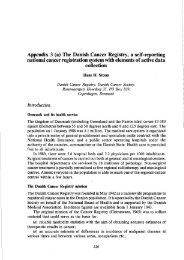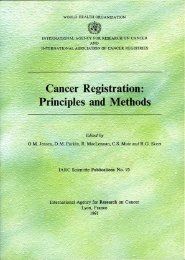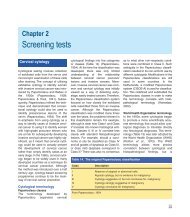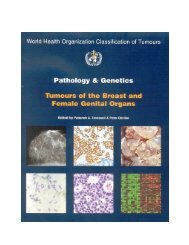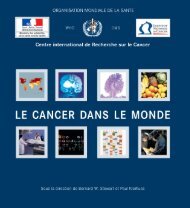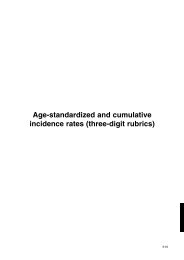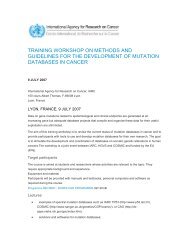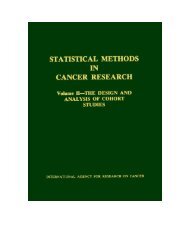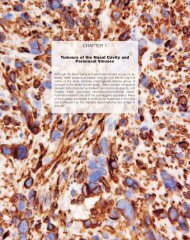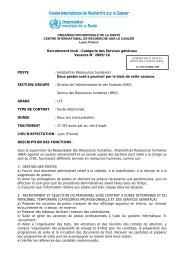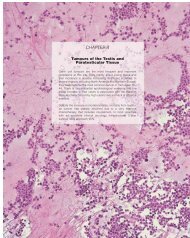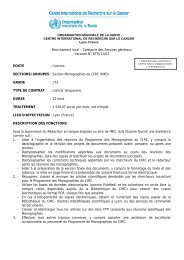world cancer report - iarc
world cancer report - iarc
world cancer report - iarc
Create successful ePaper yourself
Turn your PDF publications into a flip-book with our unique Google optimized e-Paper software.
treatment, including palliative care, are<br />
required. Above all, options must be determined<br />
for integrating a <strong>cancer</strong> control<br />
strategy into each country’s national<br />
health service and for establishing the<br />
best way of collaboration to convey new<br />
developments in <strong>cancer</strong> research from the<br />
laboratory into health care delivery [7].<br />
An agenda for action<br />
The World Health Report 1997 [12], the<br />
WHO Developing a Global Strategy for<br />
Cancer and Our Vision for Cancer from the<br />
Imperial Cancer Research Fund [13] illustrate<br />
some approaches for dealing with<br />
this problem. Priority action proposed<br />
here takes into account information contained<br />
in these <strong>report</strong>s.<br />
After an assessment of the global <strong>cancer</strong><br />
situation, and based on advances in scientific<br />
knowledge and in diagnostic and<br />
treatment technologies, as well as on<br />
experience gained in adapting and applying<br />
cost-effective interventions in clinical<br />
and public health practice, the following<br />
priorities are evident:<br />
1. To promote and sustain the commitment<br />
of political decision-makers and the<br />
support of funding agencies, health care<br />
providers, educational institutions and the<br />
media to reduce the emerging burden of<br />
suffering and deaths due to <strong>cancer</strong>.<br />
REFERENCES<br />
1. United Nations (1998) World Population Projections to<br />
2150, New York, United Nations.<br />
2. United Nations (1998) World Population Prospects: the<br />
1998 Revision, New York, United Nations.<br />
3. Greenfield S (2000) Boldly into a bright new era. Science,<br />
the Future, a Financial Times Guide. Financial Times.<br />
4. WHO (2001) The World Health Report 2001. Mental<br />
health: New understanding, new hope, Geneva, World<br />
Health Organization.<br />
5. WHO (1998) The World Health Report 1998: Life in the<br />
21st century. A vision for all. Geneva, World Health<br />
Organization.<br />
326 Cancer control<br />
2. To support the development and implementation<br />
of a Global Strategy for Cancer<br />
Reduction, and associated national <strong>cancer</strong><br />
control strategies, to deliver a package of<br />
essential medical and health interventions<br />
that are cost-effective and evidencebased<br />
for tobacco control, infection control,<br />
healthy diet, screening, treatment<br />
and care.<br />
3. To develop, test and make available<br />
guidelines and protocols for the implementation<br />
of strategies based on systematic<br />
experimentation and evidence-based<br />
choice of efficient procedures for delivery<br />
of drugs and vaccines, and the promotion<br />
of effective approaches for informing and<br />
involving health professionals and the<br />
community in <strong>cancer</strong> control.<br />
4. To mobilize adequate financial resources<br />
to strengthen the health infrastructure<br />
so that the package can be delivered as an<br />
integral part of health services. This would<br />
ensure increased access to these services.<br />
5. To stimulate relevant research for fuller<br />
application of existing knowledge and costeffective<br />
methods of detection and cure,<br />
and to accelerate research into new areas.<br />
6. To establish a global network of professional<br />
societies and an information sharing<br />
mechanism, and to ensure that current<br />
knowledge is shared, research gaps are<br />
6. Ferlay J, Bray F, Parkin DM, Pisani P, eds (2001) Globocan<br />
2000: Cancer Incidence and Mortality Worldwide (IARC<br />
Cancer Bases No. 5), Lyon, IARCPress.<br />
7. WHO (2002) National Cancer Control Programmes.<br />
Policies and managerial guidelines, 2 nd edition. Geneva,<br />
World Health Organization.<br />
8. Sikora K (1999) Developing a global strategy for <strong>cancer</strong>.<br />
Eur J Cancer, 35: 24-31.<br />
9. Parkin DM, Pisani P, Munoz N, Ferlay J (1998) The global<br />
health burden of infection. In: Weiss RA, Beral,V, Newton,<br />
R eds, Infections and human <strong>cancer</strong> (Vol. 33, Cancer<br />
Surveys), Cold Spring Harbour, Cold Spring Harbour<br />
Laboratory Press.<br />
identified and promising areas for reducing<br />
<strong>cancer</strong> burden are explored.<br />
As “population ageing” will continue and<br />
possibly accelerate in the coming years,<br />
and as favourable economic prospects<br />
may lead to undesirable and unhealthy<br />
changes in lifestyle and behaviour, a <strong>cancer</strong><br />
control strategy should be produced<br />
that can serve as a catalyst for change in<br />
health care delivery itself. It can be<br />
expected that the national strategies for<br />
<strong>cancer</strong> reduction that take into account<br />
<strong>cancer</strong> epidemiology, proven interventions,<br />
educational standards, existing<br />
resources and the economic status of the<br />
health system will contribute to a significant<br />
reduction in the global burden of <strong>cancer</strong>.<br />
The goal is a judicious mix of existing<br />
knowledge, technologies and available<br />
resources in order to develop <strong>cancer</strong> control<br />
programmes that can prevent at least<br />
a quarter of all <strong>cancer</strong>s and cure at least a<br />
third of <strong>cancer</strong> cases. As a result of acting<br />
now, by the year 2020 countries can<br />
achieve significant reductions in <strong>cancer</strong><br />
incidence and in mortality due to <strong>cancer</strong>.<br />
Opportunities exist - can they be exploited<br />
for the benefit of humankind?<br />
10. Cuzick J, Beverley E, Ho L, Terry G, Sapper H, Mielzynska<br />
I, Lorincz A, Chan WK, Krausz T, Soutter P (1999) HPV testing<br />
in primary screening of older women. Br J Cancer, 81:<br />
554-558.<br />
11. Stipp D (2000) A new way to attack <strong>cancer</strong>. Fortune,<br />
141: 164-6, 168, 172.<br />
12. WHO (1997) The World Health Report 1997, Conquering<br />
suffering, enriching humanity, Geneva, World Health<br />
Organization.<br />
13. ICRF (1999) Our Vision for Cancer: Finding Cures,<br />
Saving Lives 1995-2000, London, Imperial Cancer<br />
Research Fund.



